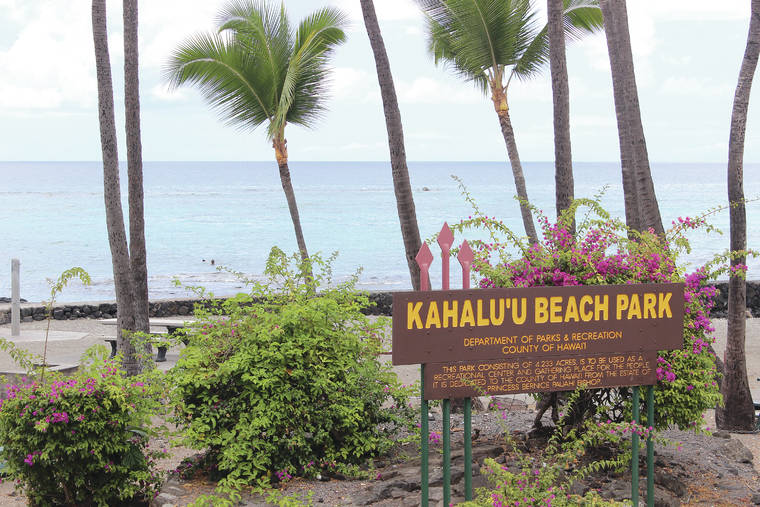#scuba Public asked not to swim, snorkel at Kahaluu Bay amid coral spawning next week – West Hawaii Today
[ad_1] It’s that time of year again at Kahaluu Bay. With cauliflower coral spawning events anticipated to start this Sunday, the Kahaluu Bay Education Center and the Department of Land and Natural Resources Division of Aquatic Resources are asking the public to refrain from swimming and snorkeling at the popular bay off Alii Drive in
[ad_1]
It’s that time of year again at Kahaluu Bay.
With cauliflower coral spawning events anticipated to start this Sunday, the Kahaluu Bay Education Center and the Department of Land and Natural Resources Division of Aquatic Resources are asking the public to refrain from swimming and snorkeling at the popular bay off Alii Drive in Kailua-Kona. Spawning happens just once a year.
Fewer people in the water enhances the spawning of cauliflower coral (Pocillopora meandrina), according to the Division of Aquatic Resources. Though the county beach park has been closed since mid-March, access across the property to the ocean is permitted.
“We’re asking everyone to voluntarily avoid snorkeling or swimming in the bay from May 10-16. During broadcast spawning events, corals emit reproductive materials (gametes) into the water column and these materials are carried by the tides to mix and generate planktonic coral larvae. Given the chance to settle undisturbed by human activity and/or pollutants, coral gametes will be able to find proper rubble colony areas to settle within the bay,” Kahaluu Bay Education Center Director Cindi Punihaole Kennedy said.
Cauliflower coral was once abundant on shallow coral reefs along West Hawaii, including Kahaluu Bay, according to the Division of Aquatic Resource and the Eyes of the Reef Network. However, environment stressors and very high ocean temperatures impacted West Hawaii in 2015 and again at the end of 2019, causing catastrophic bleaching and mortality for more than 90% of the Kahaluu Bay population.
To recover, natural reproduction events are critically important. For more than a decade, researchers have observed annual broadcast spawning events for cauliflower corals, and can now accurately predict when they will likely occur based on season, solar, tidal and lunar cycles.
Further, studies have shown that with the absence of daily visitors and a subsequent reduction in physical damage and impact of chemical sunscreens, growth and recovery along the shoreline has already been documented. Research has shown that it can take less than 24 hours for corals to successfully reproduce and settle properly.”
“We totally support this voluntary measure as natural reproduction events are critically important,” said Division of Aquatic Resources Administrator Brian Neilson.
Kahaluu Bay is one of the most popular and heavily visited snorkeling locations in all of Hawaii. Hundreds of thousands of people come to view colorful fish and dazzling coral colonies every year, and like in many other over-used locations, the aquatic life in the bay is struggling to survive, according to the Division of Aquatic Resources and Kahaluu Bay Education Center.
The center has been one of the state’s leaders in encouraging the use of reef-friendly sunscreens by conducting frequent sunscreen swaps and encouraging folks to cover up. In addition, ReefTeachers educate visitors to avoid stepping on rocks as they are home to many living animals and to please extend social distancing practices to help protect the bay’s natural resources.
“Minimizing pollutants and physical disturbances in our precious bay starting on Sunday is fitting for Mother’s Day. It will help ensure that corals are able to spawn in their natural environment without interference,” said Punihaole Kennedy.
In another move to bolster coral reefs, U.S. Reps. Ed Case and Tulsi Gabbard, and other co-sponsors, introduced in the U.S. House of Representatives a bipartisan Coral Reef Conservation Reauthorization Act to continue, update and improve the nation’s commitment to save endangered coral reefs as first set forth in a measure enacted 20 years ago.
“In the two decades since the passage of the 2000 Act, the state of our reefs has deteriorated alarmingly and the challenges and opportunities for effective management have evolved,” said Case.
Case said coral reefs are vital natural infrastructure that safeguard our coastal and island communities. Healthy, resilient coral reefs buffer against severe weather, shoreline erosion, and flooding and serve as natural breakwaters for maritime ports and harbors.
“Coral reefs also support countless American jobs in the tourism, hospitality, boating, recreation, and fishing industries,” said Case. “In particular, coral reefs are integral to commercial and recreational sport fisheries across the United States and in our nation’s Exclusive Economic Zone.”
But, the loss of coral reef ecosystems is having serious consequences for coastal communities and economies, the health of fish and other marine wildlife, biodiversity and the overall marine environment, he said.
“In fact, such loss is accelerating rapidly, for various reasons. Warmer-than-normal ocean temperatures combined with widespread pollution are threatening their health and causing mass bleaching events. Bleaching events cause corals to be more susceptible to disease and increase their chances of dying,” said Case.
The act would strengthen the federal responses to coral reef emergencies, including bleaching, vessel groundings, harmful algal blooms, coral disease/invasive species outbreaks, and unexploded ordnance underwater and expand federal grant-making for local coral reef conservation projects, including research on coral biodiversity, propagation, and resiliency. It would also authorize the U.S. Coral Reef Task Force and the Coral Reef Management Fellowship as well as the U.S. Department of the Interior to research and conserve coral resources.
“It is critical to life as we know it that we accelerate our efforts to preserve these invaluable and indispensable elements of our natural world,” said Case.
Let’s block ads! (Why?)
[ad_2]
Source link








Comments
Comments are disabled for this post.